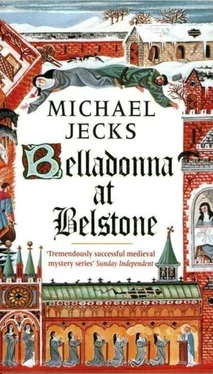The road wound along, rising gently, until they came out to a wide space of moor. Their path here was mired, but fortunately it was still frozen, so they were not covered in mud, and it was only when they reached the vill of Belstone itself, a tiny hamlet clinging to the inhospitable hilltop, that they found the ground softening; a farmer had brought his cattle along the way, and their hooves had broken up the ice, but soon Bertrand’s retinue were out on the moor again, once more at the side of the stream, following a winding track that led them into the sun.
Their path took them almost due south. Although they were still climbing, the hills rose high above them: on their right a clittered mess with gigantic tors at the very peak, while left the ground fell away into the river’s valley. Beyond it Baldwin saw a massive round hill, which dropped to a rock-strewn jumble at the water’s edge. The moors here were windswept and gave the impression at first glance of being barren, with nothing growing taller than the stunted gorse. It was this which made Baldwin think the moors were so unappealing.
Between a mile and a mile and a half from Belstone they came across signs of cultivation. The bare, stony soil had been turned, and appeared to have been ploughed, although when Baldwin looked down at it he could hardly keep from shuddering at the thought of trying to grow anything in it. His manor had gorgeous, thick red soil in which any plant thrived and on which his cattle and horses grew fat with little help; here the scrubby, dark-coloured stuff looked almost poisonous. Baldwin pitied those who tried to farm it.
The hill on their right threw out spurs around which the river curled. These outgrowths obscured their view of the land ahead, but just as Baldwin was beginning to feel certain that his feet would never thaw, that his hands would shatter like ice if struck, and was idly dreaming of spiced wine before a roaring hearth, there was a cry from the front of their party, and when he looked he saw the priory.
Here the valley was broad, and the priory huddled low among the surrounding hills, a squat little habitation skulking away from view. Baldwin thought it looked as if it was embarrassed to be seen, it was so run-down: like an ageing wench ashamed of her raddled flesh and trying to gull young churls into paying for her services while keeping always to the shadows.
“A depressing place,” commented Bishop Bertrand.
“The good nuns have little money,” Baldwin said, feeling an urge to defend the priory against the bishop’s contempt.
“There’s corruption at the heart of the place,” Bertrand said bitterly. The ride had done little for his temper, reminding him that he should now, if matters had gone as he had planned, be back in Exeter and writing up his report for his master, Bishop Stapledon. “They should have got their villeins to do any work that was needed.”
Baldwin had to admit that the priory did look as though it had not been maintained for years. The gatehouse was impressive, but the gates looked poorly hung, and he wondered whether they shut properly.
Behind, the precinct was protected by a moorstone wall which stood taller than a man, grey and intimidating, but there were sections which had fallen. Its protection was symbolic. Over it Baldwin could see the buildings lying within: a convent was not only a place to praise God, it was a self-contained unit capable of providing everything needed by the people inside, and this priory looked well-equipped with buildings. Directly before him was a long block; Baldwin felt sure this must be the priory’s main barn, filled with hay and straw. South of the barn’s yard lay another great building, probably the grange, where sufficient grain would be stored to bake bread and brew ale for the whole population. To the east of the yard were two buildings from which clouds of smoke and steam mingled: the malthouse and a kiln, both with slated roofs to protect against sparks. From the lowing of cattle there were stables and ox-stalls mixed at the western edge of the barnyard, and grooms moved about feeding and exercising their charges. To one side was the first of several storerooms with carts unloading at its entrance, then there was a low stone block with chimneys that would be the smithy. On the bank of the fast-flowing river stood the priory mill, and nearby the brewery.
There was the constant rumble and squeak of iron-tired wheels and wooden axles, a clattering and hammering from the forge, and the noise of many tens of villeins working, of cocks crowing, lambs bleating and horses snorting and blowing. It was certainly a busy priory, from the look of it.
The church was a good stone hall, set roughly in the middle of the precinct, and the first of the two cloisters was visible. Baldwin glanced up at the sun. It was standard procedure for the canons to have their area, like monks in a monastery, at the southern side of the church, while the nuns commonly lived to the north. Obviously both communities would live utterly apart, so that there could be no tomfoolery between them, and even the church itself would have two separate sections, one for each sex: the men based in the southern side. The riders had approached from the north, so presumably the nearer cloister was that of the nuns.
It was not a prepossessing sight. Shutters hung lopsidedly from windows; broken carts, dung and other mess lay in the yards behind the gatehouse; a small house had apparently burned down years before and had been left to rot; a series of outhouses looked as if they had simply collapsed, their component beams and tiles lying all about like scattered pieces from a child’s game.
The outlying lands, where sheep should have been grazing and cattle roaming, were a waste. There were sheep aplenty, further up on the moors, but down here were only a few, the halt and lame, which hobbled about the grasslands. Cattle stood hesitantly by the dairy’s sheds, waiting for the lay workers to allow them inside. Behind were the orchards, which should have been full of trees about to burst into blossom ready for the bees waking from their long winter’s sleep. Instead the trees stood malformed, their branches unpruned, many years of growth leaving them unbalanced. Several had fallen, and yet they had not been cut up and stored – ludicrously wasteful to Baldwin’s tidy mind – while the grasses grew tall and straggling between them.
Baldwin could see no vegetable plots with their serried ranks of winter cabbages, early peas and kale. The lands about the priory showed the same depressing bleakness: there was little cultivated vegetation, only weeds and furze; the land was rock-strewn and suitable only for sheep and goats.
“God’s blood, but the devil would be pleased to think he could so devastate a holy site – and here one woman has wreaked his will.”
Bertrand’s scathing tone made Baldwin feel a curious sympathy for the woman who was about to suffer the lash of his tongue. This French bishop was apparently determined to persecute this priory, just as his brethren had been keen to persecute Baldwin and his friends in the Knights Templar. This reflection lent an acid tone to his voice. “It is always a tall order for women to maintain an abbey or priory, especially since nuns cannot attract so much investment as their male brethren.”
“It matters not a jot!” Bertrand snapped. “Look at this place; if they were to work harder they could make this a small Garden of Eden, as is their duty. Instead they squander their money on fripperies.”
Baldwin noted his words, wondering what the bishop was referring to. Had he noticed too many of the trappings of wealth: fur linings in cloaks; or squirrel edging on coats? Somehow he doubted it. The nuns in Belstone would be hard set to profit from the lands they owned.
Читать дальше












